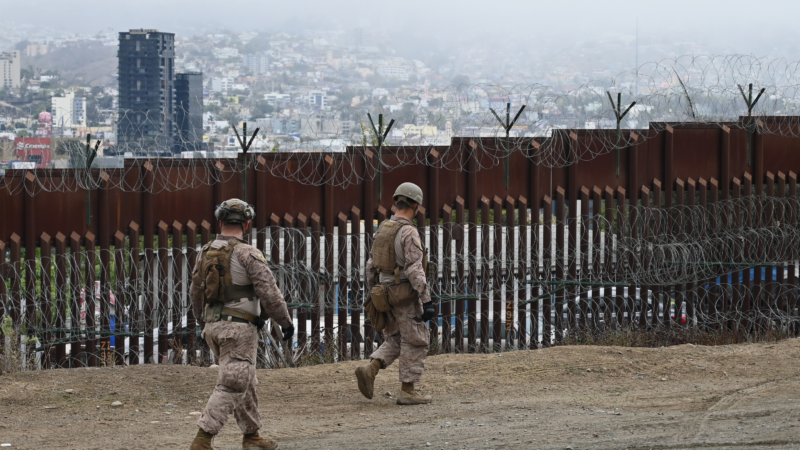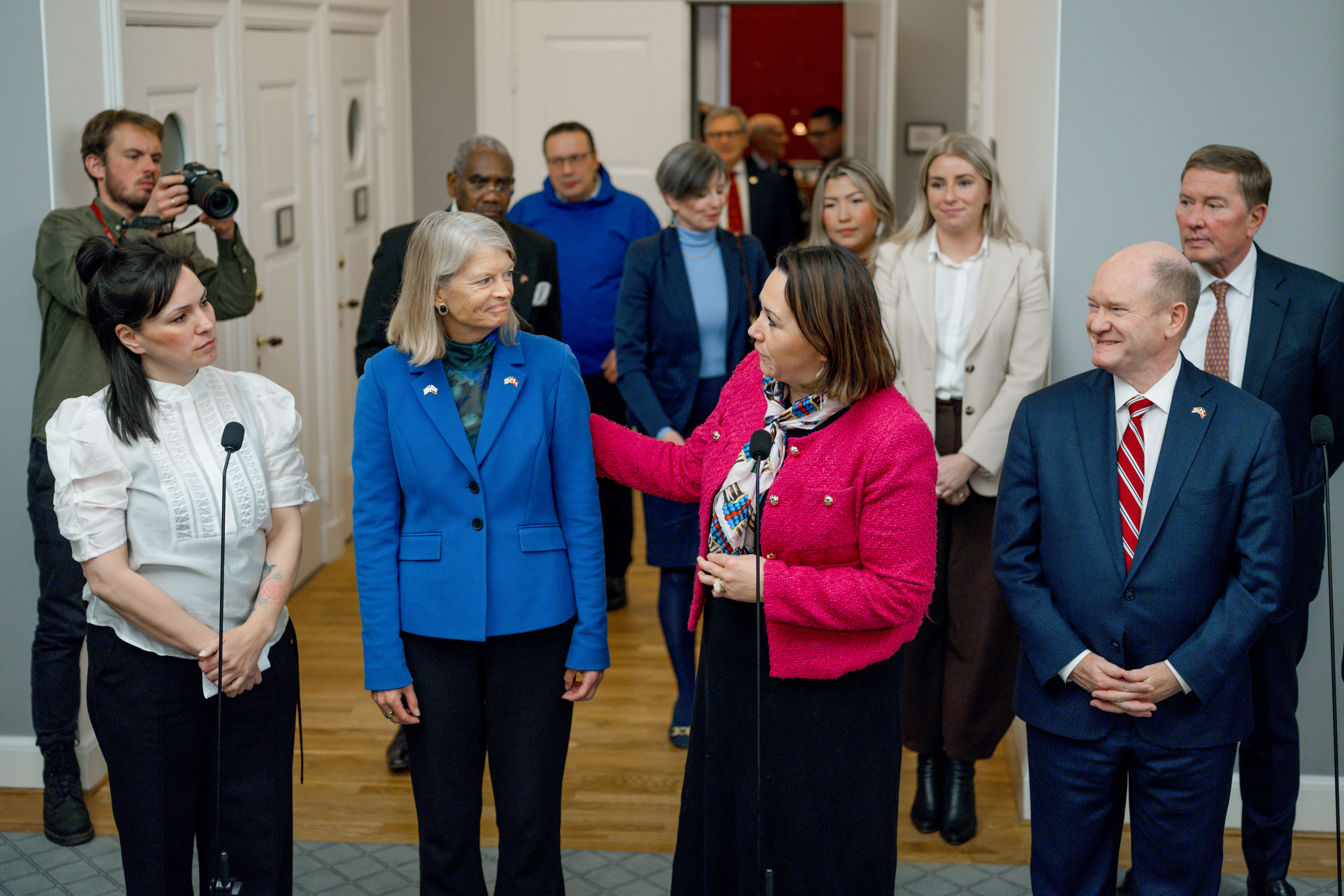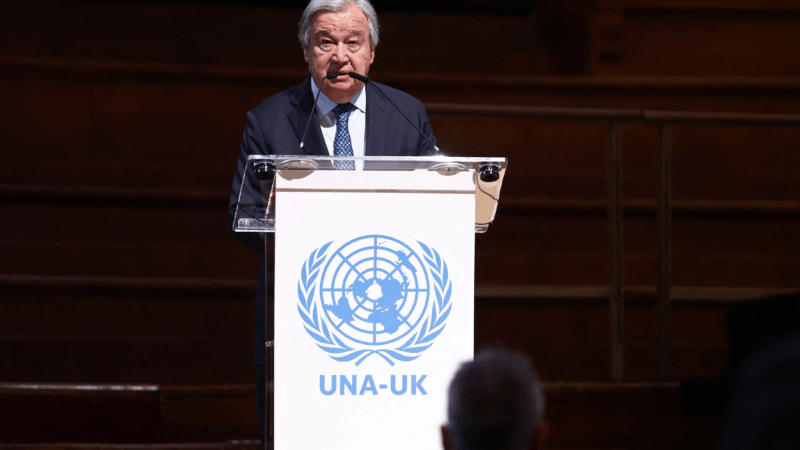Immigration poll shows growing support for restrictions, but deep divisions remain
Americans are deeply divided when it comes to the details of President Trump’s sweeping crackdown on immigration, according to a new NPR/Ipsos poll.
The poll shows growing approval for restrictions on immigration, like expanding the wall along the U.S.-Mexico border. And a plurality of respondents say they support Trump’s call for mass deportation of all immigrants living in the U.S. without legal status.
But at the same time, the White House’s most dramatic moves — detaining migrants at Guantánamo Bay, Cuba, pushing to end birthright citizenship for all children born in the U.S. and allowing immigration authorities to make arrests in schools and churches — are broadly unpopular with Democrats and independents, even as they’ve been welcomed by most Republicans.
“Americans on the whole may be more supportive of immigration restrictions in theory,” said Mallory Newall, a vice president at Ipsos, which conducted the poll for NPR. But in practice, she says, “there’s still not a lot of agreement about what that looks like.”
Immigration often ranks as a bigger concern for Republican voters than for others, and this poll is no exception: 47% of Republicans describe immigration as a top issue, compared with 19% of independents and only 9% of Democrats.
Overall, 23% of poll respondents ranked immigration as a top-tier issue — a larger share than in previous polls but still lagging far behind the top concern, “inflation and increasing costs,” at 47%.
Loading…
The president’s supporters have largely welcomed his first steps to restrict illegal and legal immigration. In the Trump administration’s first weeks, it has ramped up arrests of immigrants without legal status, suspended admissions of refugees and asylum-seekers at the southern border and rolled back legal protections for more than a million recent migrants from South and Central America.
Nearly 1 in 3 poll respondents said that recent restrictions on immigration “go too far,” while a similar proportion (29%) said the restrictions “do not go far enough.”
For the most part, Republicans stand united behind the White House’s immigration agenda. Three out of 4 support denying federal funds to sanctuary cities that limit their cooperation with immigration authorities; nearly as many back using the U.S. military to arrest and detain immigrants without legal status.
Four out of 5 Republicans support deporting all immigrants without legal status and characterize the record numbers of recent migrant encounters at the southern border as an invasion.
“So as far as I’m concerned, that was an invasion. It was not an armed invasion, certainly, but it was an invasion,” said poll respondent Thomas Dunkelberger, a longtime Republican voter from western Michigan, in a follow-up interview. “And that’s got to stop. We can’t afford it as a people.”
But the poll shows that some Trump voters have doubts about his immigration policies.
“I think he’s done a good job because we definitely do need to close the borders,” said poll respondent Maria Rose Pawlyk in a follow-up interview.
Still, Pawlyk worries that the White House is cutting off legal pathways for refugees and other immigrants who deserve humanitarian protections. And she does not support deporting all of the estimated 12 million immigrants living in the U.S. without legal status.
“There’s no easy answer to it,” said Pawlyk, who considers herself a political independent and says she voted for Trump. “You can’t just give a blanket statement of saying deport everyone, ’cause you can’t.”
Perhaps none of Trump’s executive actions has met with more opposition than his push to end birthright citizenship for the children of immigrants who don’t have permanent legal status in the United States.
According to this poll, less than a third of Americans support that proposal, which has been blocked for the moment by several federal judges.
“It just seems like a fundamental right,” said poll respondent Morgan McGee, a Democratic voter from southwest Louisiana. “If you are born here, regardless of where you came from, you should be a U.S. citizen. Like, that is just the end of it, you know?”
The White House’s push to detain immigrants without legal status at the U.S. naval station in Guantánamo Bay, Cuba, is also unpopular. Only 36% of poll respondents approved, although the idea is much more popular with Republicans.
Loading…
The poll also reveals some broader shifts in public opinion about immigration over time.
When NPR and Ipsos began asking about building a wall along the U.S.-Mexico border in 2018, only 38% of Americans supported the idea. That figure has gradually grown over time, to nearly half in our latest poll.
At the same time, support for DREAMers — immigrants who were brought to the U.S. illegally as children — has steadily declined. Seven years ago, nearly two-thirds of Americans favored giving them legal status. Now, that figure has declined to less than half for the first time.
“That, to me, is telling of the overall mood that the country is in right now,” said Newall, of Ipsos.
“But many of these newer proposals being pushed by the administration are a bridge too far. Yes, they are supported by the Republican base. But they are not supported by the American public,” she said.
The NPR/Ipsos poll was conducted from Feb. 7 to 10, 2025, with a sample of 1,013 adults online. The poll has a margin of error of plus or minus 3.8 percentage points for all respondents.
Trump has rolled out many of the Project 2025 policies he once claimed ignorance about
Some of the 2025 policies that have been implemented include cracking down on immigration and dismantling the Department of Education.
U.S. lawmakers wrap reassurance tour in Denmark as tensions around Greenland grow
A bipartisan congressional delegation traveled to Denmark to try to deescalate rising tensions. Just as they were finishing, President Trump announced new tariffs on the country until it agrees to his plan of acquiring Greenland.
Can exercise and anti-inflammatories fend off aging? A study aims to find out
New research is underway to test whether a combination of high-intensity interval training and generic medicines can slow down aging and fend off age-related diseases. Here's how it might work.
The 2026 Olympics are the most widespread in history. See what’s happening where
Competitions will be hosted at 25 venues spanning an area of more than 8,000 square miles. Here's what's happening at each of the four main clusters.
High-speed trains collide after one derails in southern Spain, killing at least 21
The crash happened in Spain's Andalusia province. Officials fear the death toll may rise.
United Nations leaders bemoan global turmoil as the General Assembly turns 80
On Saturday, the UNGA celebrated its 80th birthday in London. Speakers including U.N. Secretary-General António Guterres addressed global uncertainty during the second term of President Trump.






